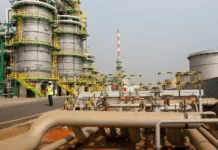
The United Arab Emirates has said that it intends to invest $163bn (£134bn) in projects to generate half of the nation’s power needs from renewables.
The major oil producing Gulf state is hoping to get close to this by 2050 and says it wants to balance economic needs against environmental goals.
The UAE has considerable solar power potential and is eager to reduce its use of fossil fuels.
The country ranks high in per capita greenhouse gas CO2 emissions.
The UAE is eighth on the World Bank’s worldwide list of CO2 emissions per capita, below Qatar, Kuwait and Bahrain.
UAE Prime Minister Sheikh Mohammed bin Rashid al-Maktoum said it is hoped that by 2050, 44% of the country’s energy needs will be provided by renewables, with 38% from gas, 12% from cleaner fossil fuel and 6% from nuclear energy.
Writing on Twitter, he said: “The plan aims to increase usage efficiency by 40% and boost clean-energy contributions to 50%.
“He who does not think of energy is not thinking about the future. The UAE government has made an achievement in drawing up a unified energy strategy for the country.”
Dubai and Abu Dhabi in particular have been at the forefront of the UAE’s push to plough resources into renewables:
- In June, Dubai announced its intention to construct a huge solar power plant scheduled to be completed by 2030
- In 2014, Abu Dhabi opened what was hailed as the world’s largest solar power operating station
- Firms from South Korea are also constructing four nuclear reactors near Abu Dhabi, which it is hoped will produce 1,400 megawatts by 2020
Elsewhere, Morocco, Tunisia and Yemen pledged in November to use only renewable energy by 2050.




